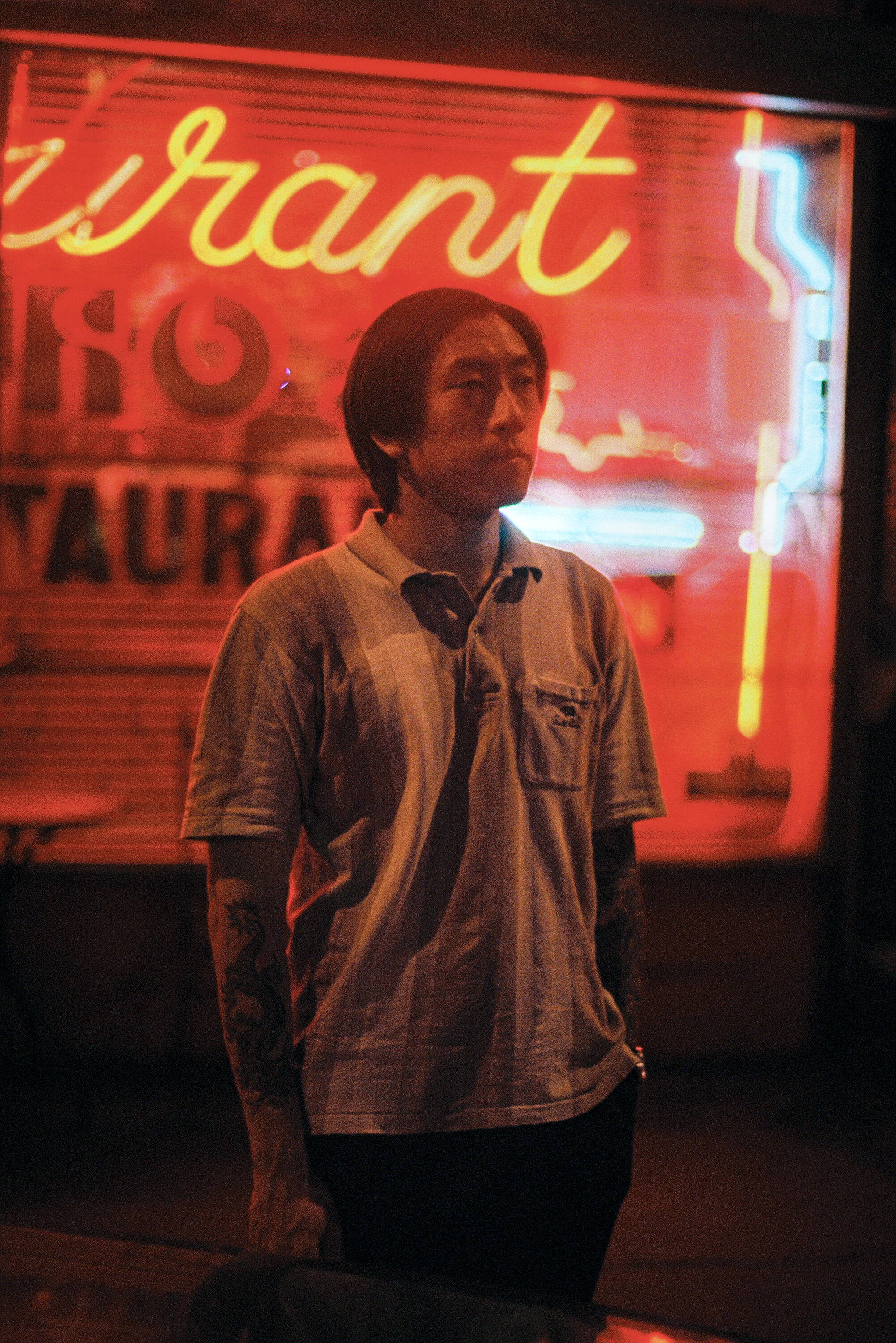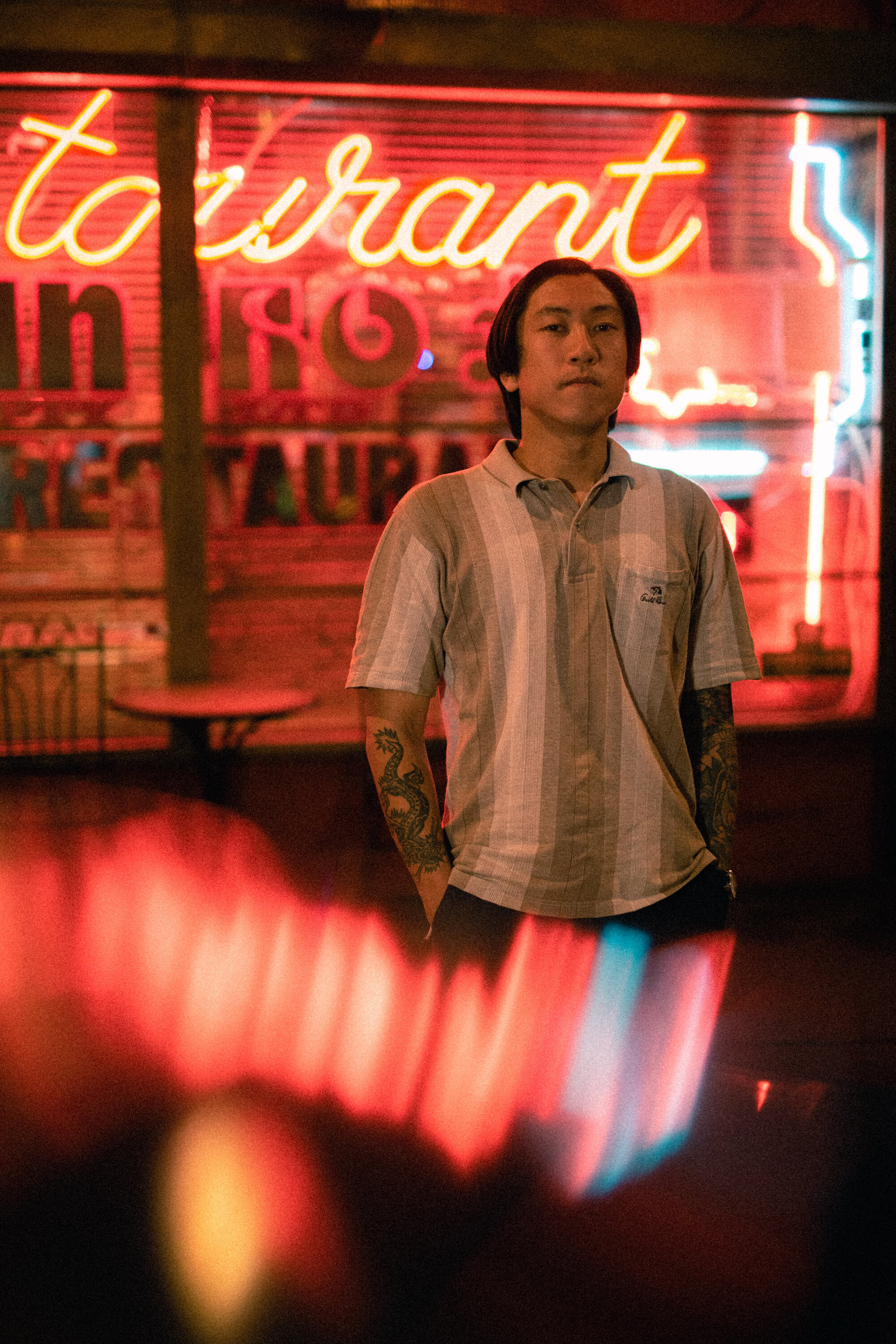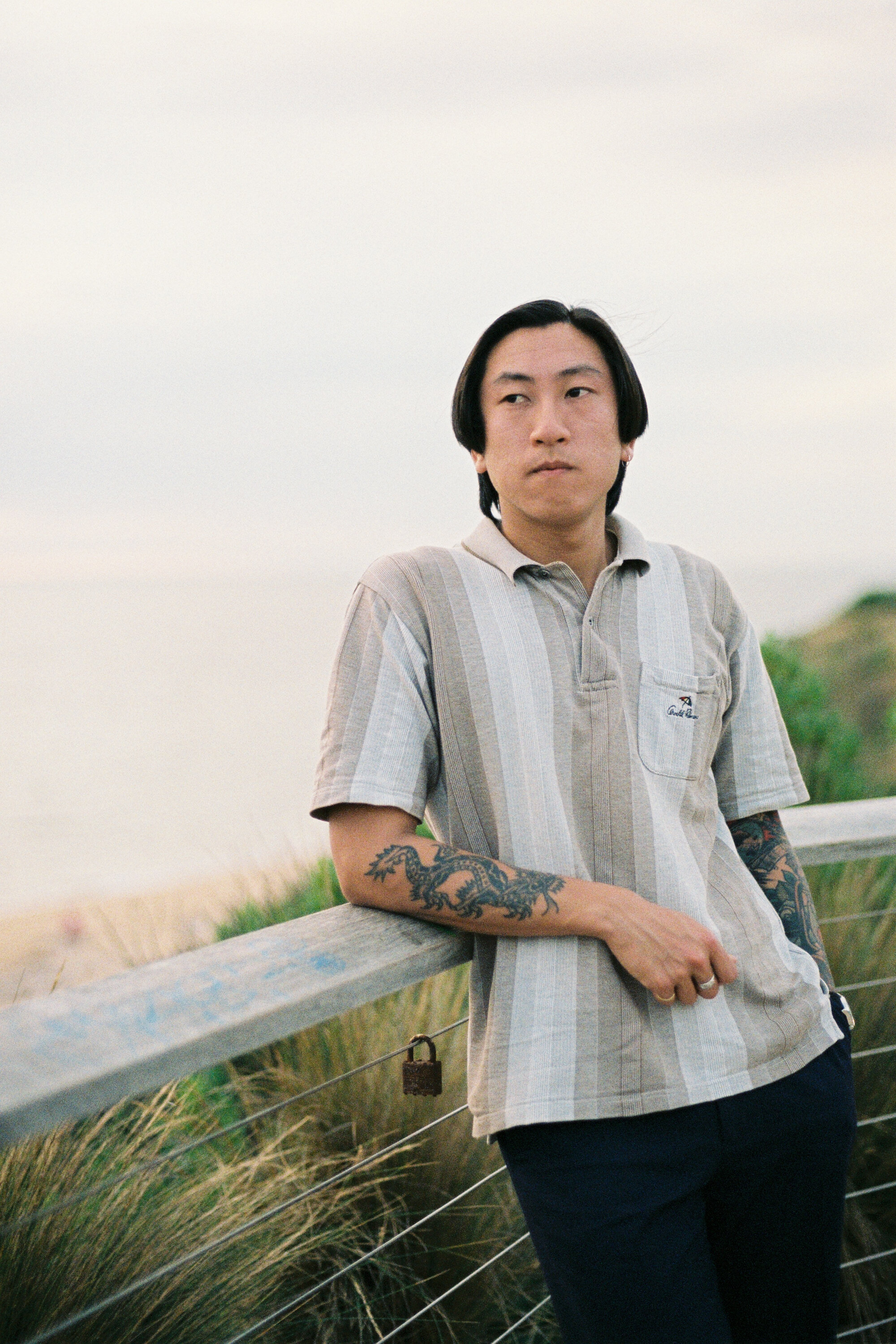Interview #139 — Andy Szetho
by Hannah Wu
Andy Szetho is a musician based in Naarm/Melbourne, who goes by Soft Powder. He writes lo-fi dream-pop, inspired by old-school films, collages and personal reveries.
He has released two EPs, Faber Ria and Shangri-La, which you can listen to here.
Andy speaks to Hannah Wu about being too shy to sing karaoke, the art of observation, sentimentalism and interdisciplinary approaches to music making.
Can you talk to me about the origins of the name, Soft Powder?
The name Soft Powder is a play on the term Soft Power, taken from international relations theory. It’s a means of persuasion, that essentially refers to influencing and shaping the inclinations of others through appeal and attraction, rather than by using force.
How do you feel about the idea of ‘representation’, in relation to your practice?
Soft Powder acts as a vehicle for me to portray a version of myself and my cultural background through music, in a way that gives me agency. It’s a way for me to reconfigure how I am seen, on my terms, rather than on the terms of pre-existing hegemonic perspectives. Throughout my life I had become so acclimatised to dehumanising depictions of Asian people in tv shows, movies and other western media, that I would habitually project those depictions and stereotypes onto myself. The project acts as a personal kind of reclamation.
What influences your work? Who are the people who inspire you?
I’m inspired by my family, relationships, culture, and my experiences in the world. This project initially began where most music projects begin, as a means of creative escapism. But it later evolved and expanded into an exploration of identity, which was something I was completely closed off to when I was younger. Growing up in Australia with a Cantonese background made me feel as though I existed between two worlds; the one I saw outside of my home, and the one I saw within it. I internalised a lot of these feelings when I was younger, and it’s only now that I’m unpacking and understanding them. Soft Powder is a reflection of my personal experiences and musical influences.
Watching films by Wong Kar Wai, Hou Hsiao-hsien, and Zhang Yimou have had a profound influence on my work. Each of these directors have their own style, but I think some of their works share distinct filmic characteristics and tropes. Fragmented characters and storylines, overarching themes of loneliness, introspection and lost love, all underpinned by wit and tones of melancholy. I’m inspired by the mood that these directors create, the worlds they construct.
I find it culturally affirming to watch movies featuring all Asian casts and Asian directors, because you see perspective. You don’t see the conventional portrayals of Asian people in western cinema, where personalities are flattened out, and people become caricatures that form the butt of jokes. It’s a breath of fresh air to view dimensional Asian characters who are confident, funny, emotional and sexy.
It’s a way for me to reconfigure how I am seen, on my terms, rather than on the terms of pre-existing hegemonic perspectives.
In your music videos, a ‘karaoke’ aesthetic seems to be pervasive. We see lyrics unfurling in front of montage footage that you’ve taken at different sites. Can you speak about the relationship between the aesthetics you choose and the music you produce?
It’s funny, I’ve had people ask whether the ‘karaoke’ aesthetic was chosen because I grew up doing it, or if I have a deep love for ‘karaoke’. The truth is, I was always far too shy to do karaoke, and I still am!
Having a ‘karaoke’ effect wasn’t a conscious aesthetic decision, it was more of a choice made to mimic film subtitles. I wanted to arouse a cinematic atmosphere that encouraged the viewer to feel detached and foreign, to complement the distant, obscured nature of the music. It’s an attempt to allow viewers and listeners feel how I have felt in the past. I use way too much reverb in my songs, and the lyrics are often hard to distinguish amongst the washed-out instrumentation. I guess the subtitles kind of serve a functional purpose as well.
All of the footage is either shot on VHS, or taken on my phone, then manipulated. I use grainy, distorted footage to elicit a DIY, home-video feel which accompanies the lo-fi aesthetic and sound. Over the last few years I’ve been lucky enough to visit locations which hold cultural significance for me, and are deeply connected with my ancestral history. I’ve taken footage in Kuala Lumpur, Hong Kong, China, and around Melbourne. It’s another way for me to present myself and my cultural background, to show aspects that are related to my family and upbringing.
Are there similarities or differences in how you approach making videos, versus making music?
I think there are definitely similarities. I’ve always felt like a background figure—but I don’t mean that in a self-pitying way! I mean, I’ve just always preferred observing, and keeping my distance with things. This could explain my dreamy, hazy music, and how the footage I shoot is often from an observational perspective; it’s discreet, ambiguous and inexplicit.
The core essence of both, is that they work to capture a feeling, an atmosphere, or a mood. When I write music, it’s because I want to capture or express a feeling, and it’s the same when I film footage. I’ve always found it difficult to create when it’s forced, or when there’s pressure to achieve something. It’s easy for me to get inside my head and over-analyse everything, at which point the self-doubt starts to trickle in.
My music and footage tends to function as montage, as layers, as collage. I like taking the time to think about how the scattered, captured ideas may look or sound, even before I actually cut and paste them all together. This is also why I prefer writing and recording my own music, rather than in a studio setting with other people. I can create and experiment freely without anyone watching over my shoulder, and I don’t have to worry about wasting anyone’s time experimenting with an idea that may not lead anywhere. I like to assemble and piece together ideas which may conventionally contradict each other, that end up complimenting each other in the end. In a way, it’s reflective of how I see myself; as someone with a fragmented identity.
I’m sorry/not sorry to embarrass you, but you know what I’m about to ask...! You used to play in a successful band, in a very different part of the music scene. Can you speak to your earlier music career? How has your music-making changed since you first started making music?
Haha, I saw this one coming. I used to play in a post hardcore/metal band when I was seventeen. It began as a youthful and explorative project with friends, but it developed into a serious pursuit. It was an invaluable journey which became a formative part of my life, but it also took a toll on my mental wellbeing.
The relentless touring caused continual uncertainty and financial stress, which put a strain on the relationships within the band. The tension began to extend into our creative space as well, which became difficult to navigate and reconcile towards the end of the band’s life. For me, these experiences left a pretty nasty taste in my mouth in relation to collaboration. I think I’m only now becoming more open to the idea of collaborating with people again, which I’ve had to relearn how to do. It feels strange and exciting. In saying that, I am still fond of the experiences and opportunities we had, and of my bandmates, whom I was privileged enough to share them with.
Our sound shifted and evolved over the years. Our first few releases were juvenile and raucous, as we were angsty teens. As we grew older and as our tastes naturally changed, we began to explore new dynamics and genres. Our last release was a blend of post hardcore, emo, shoegaze, metal, pop, and electronic elements. Our songwriting process usually started as a ‘band in a room jamming’ situation, before we would work more on our computers, recording and exchanging ideas digitally. I had different musical tastes to my bandmates, which I often tried to implement into our sound. As my ideas and contributions occasionally didn’t meld with the band’s vision, I collected and saved them for my own project, which ended up being Soft Powder.
What is a beautiful memory that you’ve had, related to music making?
In the early stages of recording my old band’s second album, our producer sat us all down, literally in a circle, and encouraged us one by one, to unreservedly open up and share everything we’d each been through. It was an incredibly intense and emotional experience, as we shared things about ourselves with one another that we’d never spoken about. This set the tone for recording and writing that album, and it taught me how to be vulnerable in my own songwriting. This memory has stuck with me ever since.
Another beautiful music-making memory I have was when I was in Hong Kong with my friend, Alex, and I showed him some music I had been working on, which later became Soft Powder’s first songs. I had been working on a couple of demos in garageband, and had been recording vocals using my laptop’s microphone every time he went down to the convenience store (god forbid if anyone heard me recording vocals). At the time, I hadn’t shown anyone what I had been working on, and I wasn’t intending on it either. He ended up giving me the confidence to keep doing it, and he helped me formulate my vision for this project. Months later, he also taught me how to take my shoddy garageband midi drum and synth loops, and reamp them through my guitar amp, which became the blueprint for my recording process for Soft Powder.
I’ve just always preferred observing, and keeping my distance with things.
What are some of your favourite sounds?
I’m inspired by feelings of nostalgia and melancholia induced by artists such as Cocteau Twins, Bright Eyes, Brian Eno, and even older artists such as Nat King Cole and Connie Francis. My music has also been influenced by familiar sounds I grew up hearing while watching movies with my grandparents in Malaysia. I try to channel the feelings and the “mood” that these sounds and memories evoke; and in doing so, blending the past and present. A lot of old Chinese films and their scores are underpinned by an overly sincere or sentimental quality, and my memories of watching them as a young child has made me relate these sounds with feelings of nostalgia. I’m attracted to sounds that evoke these feelings for me; warm synth strings, glistening guitars, distant vocals, guzheng, erhu and dizi samples.
How do you feel about the music scene in Melbourne?
Melbourne has a thriving and diverse music scene; but by diverse, I mean in musical style and genre. There are so many niches. While it can be supportive in many ways, I also think parts of Melbourne’s music scene can be ‘cliquey’ and competitive. Some of these niches tend to develop, and unconsciously enforce invisible boundaries and strict constraints around what should be accepted and what shouldn’t. It’s ironic because these niches present themselves as inclusive and as a safe haven for identities that exist outside of the “mainstream”, while being incredibly hierarchical. Despite this, Melbourne is still a great place to be an emerging or established artist as there are so many platforms and avenues for engaging with audiences.
Do you have any advice for emerging musicians?
I wouldn’t consider myself to be one to take advice from, but finding your community/communities is so important. If you’re struggling to find them, then try to build your own. Having a network of like-minded artists who you share interests and experiences with, puts things into perspective. It will make you feel “visible”, which is something that a lot of people take for granted. It can be life changing. Not just for your creative pursuits, but for your own wellbeing.
Fight to have your voice heard, whilst acknowledging that it can be a lot more difficult for different marginalised demographics. Be conscious of the space that you operate in.
Don’t be afraid to be vulnerable and honest. Unfortunately, releasing and performing your music requires putting a part of yourself ‘out there’, which consequently invites scrutiny. Try to ignore the noise and just focus on your craft. It’s all that matters in the end.
Lastly, work hard, don’t cut corners, and don’t be entitled - never expect anything to just fall into your lap.
What have you been thinking about lately?
I’ve been thinking about how this interview has encouraged me to interrogate my creative processes and musical past in a way that I haven’t before. I’ve been thinking about what the world will look like after the pandemic, and the increasingly tense trade relations between China and Australia. I’ve also been thinking about improving my cooking. And a recent discussion I had with my brother about authenticity and originality; authenticity being vital and originality being non-existent.
What have you been listening to lately?
Today I was listening to Teresa Teng, The Radio Dept., Kate Bush and Death Cab For Cutie.
What have you been watching lately?
I recently watched a miniseries called The Little Drummer Girl, about a young actor who is recruited by Mossad. I also recently watched Taipei Story by Edward Yang. I had been scouring the internet for over a year to find a working stream, and at one point I almost paid an excessive amount on eBay for a DVD copy, but then I realised I didn’t have a DVD player. Anyway, I eventually found one and it was worth the wait. It follows the disintegration of a childhood couple’s relationship, set behind Taiwan’s fractured identity and liberalisation during the late 80’s. It was beautifully shot and it has made me want to watch more of Edward Yang’s movies.
What have you been reading lately?
I haven’t been able to read much lately as my studies take up most of my time, but the last book I read was The Unbearable Lightness of Being by Milan Kundera. It was thought-provoking and I wasn’t sure how to feel afterwards. I still don’t, and I think I’ll read it again when I have time.
How do you practice self-care?
Going for long walks with my headphones in, or practicing my Mandarin/Cantonese.
What does being an Asian-Australian mean to you?
It means eating rice for breakfast everyday as a child, then having a sleepover at a friend’s house and pretending to be thrilled about eating toast and cereal. It means being on school camp and getting told off by your teachers for not knowing how to ‘properly’ use a knife and fork to eat green peas. It means wondering why your friends take their showers in the morning rather than in the evening before you get into your clean and cosy bed.
Ah, so relatable! Love these observations.
On a more serious note though, being Asian-Australian means constantly unraveling and discovering a whole new part of myself that was always there, but I had previously tried to conceal. It continues to fuel a curiosity as I grow older, and it’s the constant feeling of everything finally making sense, of being able to see things more clearly.
Being Asian-Australian is a unique identity in itself, and it requires respecting the traditional land and peoples that my parents left their native country for, and challenging the systems which often exclude specific people and communities. For me, it means routinely piecing together the fragments of my identity. And hopefully, through my actions and output, being able to have a broader influence that strengthens ties and bridges gaps between the cultures I exist between.
A lot of old Chinese films and their scores are underpinned by an overly sincere or sentimental quality, and my memories of watching them as a young child has made me relate these sounds with feelings of nostalgia.
Find out more
Interview by Hannah Wu
Photographs by Hashem McAdam
Photographs taken prior to COVID-19.






